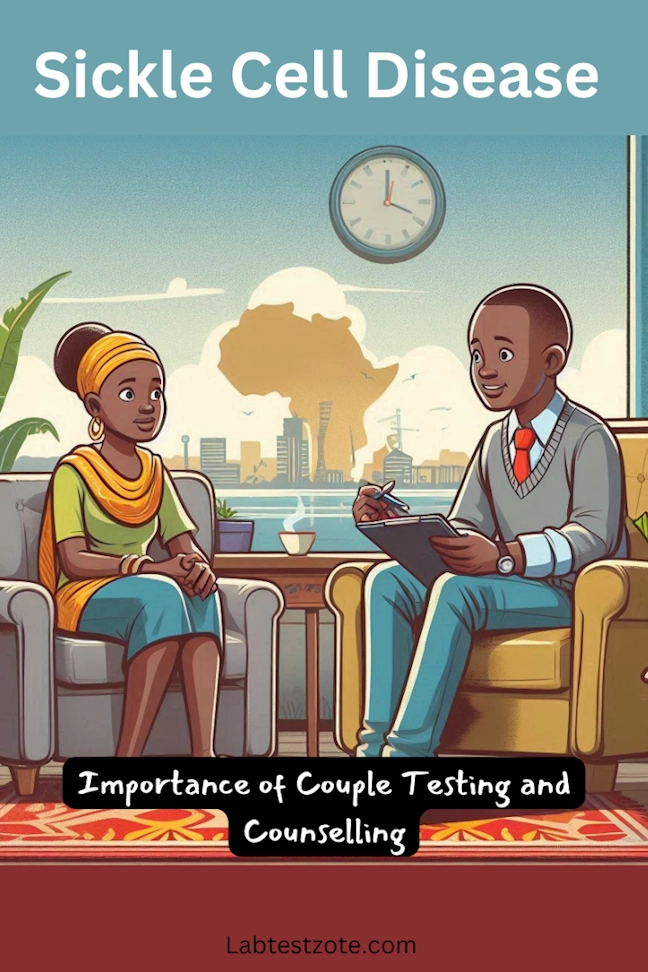What is Sickle cell Disease?
Sickle cell disease (SCD) is a genetic disorder that affects millions worldwide, with a significant impact in Africa, particularly in countries like Kenya. It is crucial to raise awareness about SCD, especially among couples planning to start a family, as informed decisions can significantly reduce the burden of this disease. This article aims to provide comprehensive recommendations for Couples Sickle Cell Disease Testing in Kenya, emphasizing its importance, available testing options, and the role of community outreach and policy support.
Various health institutions and authorities have issued recommendations for couples to undergo sickle cell trait testing before getting married or having children. This comprehensive approach aims to reduce the incidence of SCD by promoting genetic counselling and informed decision-making among couples.
Table of Contents

Understanding Sickle Cell Disease
Sickle cell disease is a genetic disorder caused by a mutation in the HBB gene that codes for hemoglobin, leading to abnormal hemoglobin production. This results in red blood cells that are shaped like sickles, which can get stuck in small blood vessels, causing various health issues. The disease is inherited in an autosomal recessive pattern, meaning that a person must inherit two copies of the mutated gene (one from each parent) to have the disease. Common genotypes include AA (normal), AS (sickle cell trait), SS (sickle cell anemia), and SC (sickle cell-hemoglobin C disease).
Symptoms of SCD include recurring episodes of pain, infections, and organ damage. In Kenya, regions like the western, lake, and coastal areas have higher prevalence rates due to their malaria-endemic status, as sickle cell trait offers some protection against malaria.
The Burden of Sickle Cell Disease in Kenya
In Kenya, sickle cell disease is a significant public health concern. The disease affects thousands, with a high prevalence in certain regions. Children with untreated SCD face high mortality rates, often due to infections and other complications. The socioeconomic impact is substantial, affecting not only families but also the healthcare system, as managing SCD requires ongoing medical care and hospitalizations.
The connection between malaria and SCD is critical in Kenya. While sickle cell trait offers some protection against malaria, the disease itself poses significant health risks. Thus, understanding and managing SCD is crucial in these regions.
Importance of Couples Testing for Sickle Cell Disease
Couples testing for sickle cell disease is essential for individuals planning to start a family. If both partners have the sickle cell trait (AS), there is a 25% chance with each pregnancy that their child will have SCD (SS), a 50% chance that the child will be a carrier like the parents (AS), and a 25% chance that the child will not inherit the trait (AA).
Pre-marital or pre-conception testing allows couples to make informed decisions about family planning. Genetic counseling is a vital component of this process, helping couples understand their risks and options.Testing Options Available in Kenya
Several testing options are available in Kenya for detecting sickle cell disease and trait:
- Genotype Testing: This involves analyzing DNA to determine the specific mutation causing SCD.
- Hemoglobin Electrophoresis: A laboratory test that separates different types of hemoglobin to identify abnormal hemoglobin variants.
Testing can be conducted at various locations:
- Public Hospitals: Facilities like Jaramogi Oginga Odinga Teaching and Referral Hospital offer testing services.
- Community Health Centers: Many community health centers provide basic screening services.
- Private Laboratories: Private labs like Labtest Zote often offer more comprehensive testing options, personalised service and reasonable turn around time for results
For indepth discussion on laboratory evaluation of Sickle cell disease click the link.
Policy Recommendations and Institutional Support
Current policies in Kenya focus on newborn screening for SCD, but there is a need for more comprehensive strategies, including mandatory couple testing in high-risk regions. Advocacy efforts should involve government institutions, healthcare providers, and religious organizations to promote awareness and testing.
Institutional support is crucial for implementing these policies effectively. This includes training healthcare workers in genetic counseling and ensuring that testing services are accessible and affordable.
There are a number of organisations actively supporting sickle cell disease such as JOOTRH.
Community Outreach and Education
Community outreach and education are vital in reducing the stigma associated with genetic conditions like SCD. Public health campaigns can effectively raise awareness about the importance of testing and the risks associated with SCD. Successful community initiatives include workshops, media campaigns, and partnerships with local leaders to disseminate information.
Benefits of Couples Sickle Cell Disease Testing
- Reduced Incidence of SCD: By identifying carriers of the sickle cell trait, couples can make informed decisions about their reproductive plans, reducing the number of children born with SCD.
- Improved Health Outcomes: Early detection and management of SCD can significantly improve health outcomes, reducing hospital admissions and deaths related to the disease.
- Informed Decision-Making: Genetic counseling and testing empower couples to make informed decisions about their reproductive health, ensuring they are aware of the risks and implications of having children with SCD.
- Community Awareness: Public awareness campaigns and educational sessions promote community understanding of SCD, encouraging early detection and prevention.
Read More: Role of Laboratory Testing In Sickle Cell Disease
Genetic Counseling: A Critical Component
Genetic counseling plays a pivotal role in helping couples understand their test results and make informed decisions. Counselors provide guidance on reproductive options for couples at risk, including:
- Assisted Reproductive Technologies (ART): Techniques like IVF with genetic screening can help select embryos without SCD.
- Adoption: For couples who prefer not to have biological children.
- Choosing Not to Have Biological Children: Some couples may decide against having children to avoid passing on the disease.
Counselors also help couples navigate the emotional aspects of these decisions.
Conclusion
Couple testing for sickle cell disease is a critical step in reducing the incidence of this genetic disorder in Kenya. By understanding the risks, accessing available testing options, and making informed decisions, couples can contribute to healthier families and communities. As we move forward in 2025, it is imperative that we continue to advocate for increased awareness, improved access to testing, and comprehensive support for those affected by SCD. Together, we can create a future where every child has the best possible chance at a healthy life.
Laboratory Tests Tests Related To this Topic
-
Genotype Test for Sickle Cell DiseaseKSh16,750
-
Hb Electrophoresis TestKSh4,650
-
Complete Blood Count (CBC)KSh945
